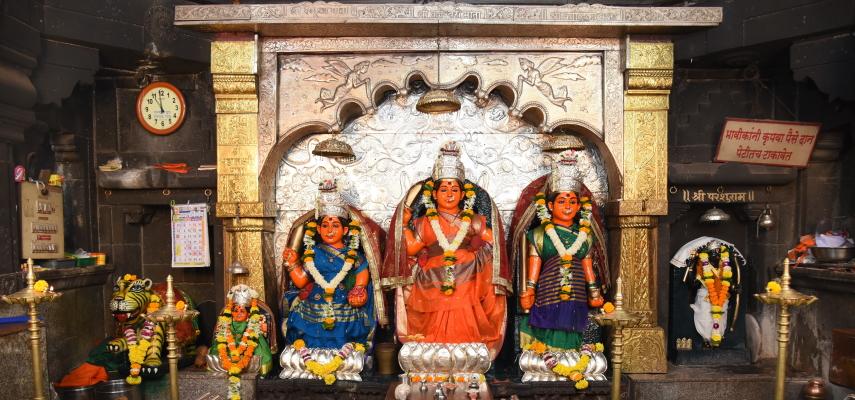Legends

The Puranas mention the region of Vadvali as a place visited by Rama and Parashurama, avatars of the god Vishnu. The legend says that Parashurama performed a yajna (fire offering) at Vadvali and the hills of volcanic ash in the area are its residue.
The primary deity of the temple, Vajreshwari (vajreśvari), also spelled Vajreshvari, also known as Vajrábái and Vajrayogini, is considered an incarnation of the goddess Parvati or Aadi-Maya on earth. Her name literally means "the lady of the Vajra (thunderbolt)". There are two legends about the goddess' origins, both associated with the Vajra.
A Rakshasa (demon) named Kalikala or Kalikut troubled the rishis (sages) and humans in the region of Vadvali and waged a war against the devas (gods). Distressed, the gods and sages headed by Vashishta performed the TriChandi yagna, a fire offering to the Goddess, to please Her. An aahuti (offering of ghee in yajna) was not granted to Indra (king of devas). Enraged, Indra hurled his Vajra - one of the most powerful weapons in Hindu mythology- at the yajna. The terrified gods and sages prayed to the Goddess to save them. The Goddess appeared in all her glory at the site and not only swallowed the Vajra and humbled Indra but also killed the demons.Rama requested that the Goddess stay in the region of Vadvali and be known as Vajreshwari. Thus, the Vajreshwari temple was established in this region.
Another legend in the Vajreshvari Mahatmya says that Indra and other devas went to goddess Parvati and requested her to help slay demon Kalikala. Goddess Parvati assured them that she would come to their aid at the right time, and ordered them to fight with the demon. In the battle, Kalikala swallowed or broke all weapons thrown at him. Finally, Indra threw the Vajra at the demon, which Kalikala broke into pieces. From the Vajra emerged the Goddess, who destroyed the demon. The devas extolled her as Vajreshwari and built her temple.
The seventh canto of Navanath Kathasar states that Machindranath served the goddess Vajrabhagawati (Vajreshwari) for a month by giving her a bath of the water of hot springs.
This place is also called Nath Bhoomi, a land of Nathas.